|
Next month, the long-anticipated second installment of the “Matrix” series
will be out in the theaters, again returning public consciousness to the
idea that what we think of as “real” should not be taken for granted. The
timing is quite apt, as for those with eyes to see and ears to hear, there
can be little doubt powerful political forces are capable of manipulating
popular opinion to the point that the mass public triumphantly shouts black
really is white, war really is peace, ignorance is strength and freedom is
slavery.
In this article we will reveal new information that, if we were living in a
truly free world of information sharing, should be seen as a startling
breakthrough, finally revealing the true nature and structure of our
universe. Yet, experience has shown us that very little mainstream attention
is given to such advancements, as the questions that are raised bring in all
the “Pandora’s Box” elements of parapsychology and metaphysics… proof that
the universe is a product of intelligent design, an Ultimate Being with
holographic and / or fractal properties from the quantum to universal level,
and that higher beings are actively conveying useful information to help us
understand and answer these questions.
WHAT’S THE MATTER
In order to understand our “big” new discovery, we must start small. Most of
us take the existence of the physical world for granted. Yet, what we “know”
about physical matter hasn’t really changed much in the last 100 years.
Despite a huge number of proven inconsistencies, the average person will
probably still tell you that matter is made of molecules, which in turn are
made of atoms, which in turn are made of little particles whirling around a
nucleus like miniature planetary systems, filled with 99.999% “empty” space.
This is known as the Rutherford model of the atom in the science of “quantum
physics,” and as Dr. Milo Wolff says in Exploring the Physics of the Unknown
Universe,
Whoever stated the notion of electrons traveling around the nucleus like
planets made a terrible blunder! If you have learned such an idea, discard
it immediately… all experiments to probe a central structure of the electron
have been negative. (Wolff, 1990)
Unlike Dr. Wolff, the average modern scientist will tell you that atoms are
made of “wavicles,” something that acts like a particle when a scientist
measures it as a particle and acts as a wave when a scientist measures it as
a wave. This might seem plausible in a mathematical equation, but it is
impossible to create a workable physical model from it. When you sit in your
chair, you don’t have to believe it is a chair in order for it to hold you
up.
Almost all of our conventional scientific models are riddled with
inconsistencies, yet these are almost never discussed in the mass print
media. As a result, you can examine your surroundings right now as you read
these words and easily take for granted that you know what you are looking
at. “ Wood. Metal. Plastic. Glass. Fabric. Foam. I know this stuff, I know
how it is made. It was there yesterday, it will be there tomorrow… just
dead, inert, lifeless stuff.”
The fact of the matter, if you will excuse the pun, is that no mainstream
theory even begins to solve all the paradoxes raised by quantum physics.
Mainstream science does not know what matter really is. We cannot emphasize
this enough. Most people think “we” know the answers, but no mainstream
model has been able to solve the puzzle. Thankfully, enough
university-educated people have written about these problems and attempted
to solve them on the Internet that we do know the shortcomings of the
conventional models.
With the wealth of previously suppressed and / or de-emphasized research
that is now available on the Internet, we can construct a vastly superior
model of the cosmos that solves the paradoxes and answers the criticisms.
This takes a great deal of time and care to articulate properly, and the
results can be found in,
Convergence, volumes I, II and III. For this article I would like to reveal some fascinating new
information that I have not yet written about in the series.
If we want to grasp the true nature of matter, we need to understand that
the members of secret societies such as the Masonic Order are required to
swear on pain of death that they will “ever conceal and never reveal” the
secrets of the Order, and for a Royal Arch Mason and above, “murder and
treason [are] not excepted.” (Duncan, 1865, Still, 1990.) One of the
ultimate Masonic secrets is that geometry is the hidden key to unlock the
mysteries of the Universe – i.e., “God Geometrizes.” (Lawlor, 1985)
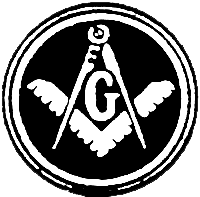
Figure 1 – The Masonic emblem.
The “G” in the Masonic logo symbolizes geometry as well as God, the “Great
Architect of the Universe.” Above the “G” is a compass and below the “G” is
a carpenter’s square, these being the two main instruments through which a
study of “sacred geometry” is conducted. (Lawlor, 1985) The aspirant is
literally taught how to draw and meditate upon various geometric forms,
understanding that he is coming into contact with the energies of Creation
by doing so.
Hence, any research that shows the importance of “sacred” geometry in
quantum- and / or astrophysics, the very tiny or the very large, is not
likely ever to surface into public view. Rev. CG Finney wrote how even in
the late 1800s, members of the Masonic Order boasted that they had control
of the US print media, government, military and justice system at the
highest levels. (Finney, 1867) Finally, most people are beginning to
understand how heavily controlled the US media really is – especially those
who are not Americans and those who actively use the Internet for more than
just email and instant messaging.
Richard Hoagland’s Monuments of Mars (1990) documents how a simple
four-sided pyramid known as a tetrahedron, when sized to fit perfectly
inside a planetary sphere, will determine the most energetically active
areas on a planet. The most obvious signs of this activity are the
geometrically positioned Great Red Spot on Jupiter and the
Great Dark Spot
on Neptune. Notice the similarity between this diagram and the Masonic
emblem in Figure 1.
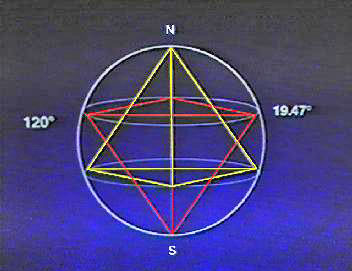
Figure 2 – The interlaced tetrahedron inside of a sphere, showing coordinate
points. (Hoagland, 2000)
David Hatcher Childress’ Anti-Gravity and the World Grid shows that the
tetrahedron is only one of five geometric forms, collectively known as the
“Platonic Solids,” affecting the structure and behavior of the Earth. As
written in my second volume of Convergence, (Science
of Oneness - Chapter 12)
other planets in the Solar System show signs of these fields as well, and in
time we will have far better data to demonstrate the effects of these
“grids.” Figure 3 shows the “octave” of Platonic Solids, which illustrates
the ancient Indian theory of how they correspond to the colors of the
rainbow spectrum and the notes in a “pure Diatonic” major scale.

Figure 3 – The “Octave” of Platonic Solids. (Wilcock, 1999)
Heliophysicists have discovered that the Sun has an “octopolar” magnetic
field. Such a field maps out all the coordinate points for an octahedron,
which looks like two Egyptian pyramids connected base-to-base. There are
four evenly-spaced points along the equator of the Sun that are known to
emit showers of charged energy “particles” like a slowly-rotating lawn
sprinkler. Four times each month, the Earth passes through another wave of
these particles, which are either positively or negatively charged. If you
connect the dots between the four points of this energetic emergence along
the Sun’s equator and its north and south pole, the octahedron becomes
apparent – and we can see there is energy streaming out of all of its
points.
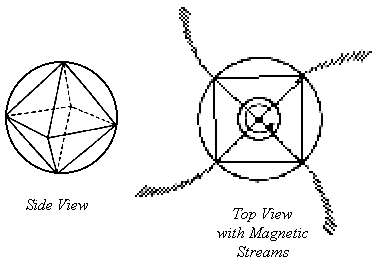
Figure 4 – Octahedral energy patterns within the Sun. (Wilcock, 2000)
If the ancient scrolls are correct, then sacred
geometry also has to be the ultimate solution to the problems and paradoxes
of quantum physics, the science of matter. As documented in my third volume
of Convergence, (DivineCosmos) Rod Johnson’s model has addressed
every single paradox of quantum physics and provided a geometric solution to
such long-standing mysteries as the derivation of Planck’s constant, the
fine-structure constant, the weak / strong force ratio, the origin and
structure of valence electron shells, the mystery of charge polarity, et
cetera.
The most effective way to explain why these geometric “stress points” emerge
is vibration. Credible researchers such as Dr. Hans Jenny and Dr.
Buckminster Fuller have shown that all five of the Platonic Solid geometries
will emerge naturally when you vibrate a sphere of fluid at a given “pure”
sound frequency. The higher the frequency, the more complex the geometry
will become. If you reduce the frequency, the original geometry will again
emerge in exactly the same way. Hence, much as a snowflake crystallizes a
moment in the activity of water, a given “pure” sound tone creates its own
type of crystal in any fluidlike substance.
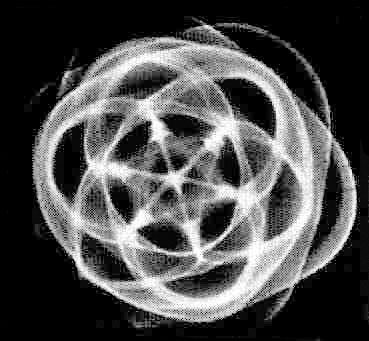
Figure 5 – Visible geometric arrangement of fine particles within vibrating
droplet of water. (Jenny)
We are not saying that there are literally geometric crystalline objects
inside these planets or in the quantum realm – rather, geometry is the
simplest form in which vibration may be seen in any natural medium, such as
a fluid. The lines of the geometric forms define areas with a lower degree
of pressure than their surroundings, and thus higher pressures quite
naturally rush out through these areas, much as we see in the points along
the Sun’s equator or in the Great Red Spot of Jupiter. The “fluid,” in the
case of the Universe, is a non-physical energy medium that we call the
“aether.” Our Convergence series, especially the third volume, gives
definitive proof of its existence and fluidlike properties.
In the geometry of vibration, all loose materials are caught up in the
flowing pressure currents to collect at the points and lines of a geometric
form. This is similar to how iron filings can be made to line up with the
field lines of a magnet, thus making the geometry of the magnetic field
visible. Another way of showing this effect is by spreading an even layer of
sand over a large drumhead and then striking the drum in the middle – the
sand will form into geometrically-spaced piles near the rim of the head.
Sometimes lines are visible as well.
THE UNIVERSAL MANDALA
Now let’s think big… really big. Imagine that each galaxy is like a speck of
sand in the universe. Imagine that the universe itself is filled with an
energy source that is vibrating, and has certain qualities that are similar
to a fluid. In the model we are proposing, pressure currents throughout the
universe would cause these galaxies to naturally drift into alignment with
the borders of a matrix of geometric patterns, the result of which would
look much like an ancient Indian mandala.
We know that galaxies gather together into large clusters, known as
“superclusters,” and that they can often be roughly spherical in shape. Each
supercluster may contain literally billions of galaxies inside of it.
Naturally, the average person assumes that these superclusters are scattered
randomly throughout the Universe, nothing more than the aftermath of an
explosive “Big Bang” where “nothing” exploded to become the Cosmos we now
know. Let’s take a look at what scientific observation and mapping of
superclusters by Drs. E. Battaner and E. Florido have shown. In the paper
entitled
The Egg-Carton Universe, they write,
The distribution of superclusters in the
Local Supercluster neighbourhood
presents such a remarkable periodicity [i.e. ordered pattern] that some kind
of network must fit the observed large-scale structure. A three-dimension
chessboard has been suggested. The existence of this network is really a
challenge for currently-suggested theoretical models… In this case, however,
the identification of real octahedra is so clear and the network is so
noticeably well-defined that a direct inspection is straightforward. (E. Battaner and
E. Florido, 1998)
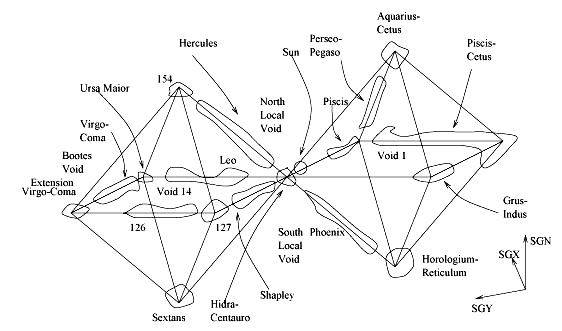
Figure 6 – The two large octahedra closer to the Milky Way. (Battaner and
Florido, 1997)
A picture truly is worth a thousand words – and the obvious results of this
Spanish discovery provide some of the most fantastic, undeniable
confirmation for our Convergence / Divine Cosmos model that we have ever
seen. In our opinion, this is every bit as important as the discovery by Nicholaus Copernicus that the Sun was at the center of our Solar System.
Yet, once we knew what to look for, a Google search on “Battaner octahedron”
only came up with 15 hits for the entire world of online information that
could potentially have covered this fantastic discovery! Even more
amazingly, this information has been around for nearly ten years! Why, then,
is it so totally and completely obscure? [See Appendix 1] Could it be that
this finding gets too close to Masonic secrets about the nature of Creation?
With the reach of our publicity on the Internet, these obvious geometric
structures in our Universe will soon become another piece of “common
knowledge” for the new astrophysics model that we are helping to bring to
the world stage. The baffling questions raised by this discovery have, for
the time being, been effectively shut down by simple references to the
rather boring, obvious-sounding idea that they are caused by “magnetic
filaments” in the Universe. Consider the following text from no less than
Caltech, entitled Large Scale Structure and Magnetic Fields.
The filament network, if magnetic in origin, must be subject to some
magnetic restrictions. The simplest lattice matching these restrictions is
an “egg-carton” network, formed by octahedra joining at their vertexes. This
“egg-carton” universe would have larger amounts of matter along the edges of
the octahedra, which would be the sites of the superclusters. Outside the
filaments there would be large voids, devoid not only of baryons but also of
magnetic fields…
These theoretical speculations are compatible with present observations of
the large scale structure as delineated by the distribution of
superclusters. It is easy to identify at least four of these
giant octahedra
in real data, which comprise observational support for the egg-carton
universe. Two of them, those which are closest and therefore most
unambiguously identified, are reproduced in Fig. 22. [DW: This is the image
we see in Figure 7.] Nearly all the important superclusters in the catalogue
by Einasto et al (1997), as well as nearly all the important voids in the
catalogue by Einasto et al. (1994) can be located within the octahedron
structure. (Caltech, retrieved 2003)
If you read the above paragraph carefully, you will note that
Caltech says
that “at least four” of the octahedra are easy to see. No one can change or
“debunk” this fact – it is simply another piece of data that must be
incorporated into any accurate cosmology of the universe. It is important to
realize that this “chessboard” structure reaches as far as our instruments
have been able to measure; the entire Universe of galactic superclusters
appears to be arranged into a gigantic matrix of endless numbers of octahedra fit perfectly together like an endless egg carton, stacked at
least three layers high. The only problem with this article is that there is
no way to model an octahedron with conventional magnetic fields in the
laboratory. We can, however, model it very easily using fluid dynamics.
This, however, brings up the suppressed notion that there is a fluidlike,
non-physical “aether medium” in the Universe, the source of all physical
matter, which the Convergence series discusses in great detail.
A CONVENIENT DIAGRAM OF THE UNIVERSE
We do already know that the cosmic microwave background (CMB) energy of the
Universe is roughly spherical, and that all the superclusters are in a
“flat” area, like a pancake, in the middle of this sphere. Hence the
“matrix,” when viewed from the top down, would have to look like a circle
with a pattern of diamonds in it, similar to a lotus flower. Invariably,
people would have difficulty visualizing this, so we realized we would need
to make a diagram. Once a good visualization of the picture finally arrived
in the mind’s eye, it took about 30 seconds to realize that the image had
already been rendered… in the unlikely medium of a living wheat crop.
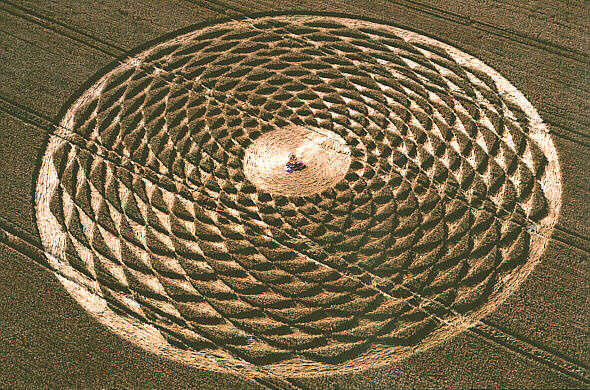
Figure 7 – English crop formation at Woodborough, August 13, 2000
What we see in the “crop formation” of Figure 7 is a simplified view of the
structure of the Universe, looking at it from the top down. The diamond
shape of the octahedron can be seen by connecting each raised triangle of
crop (dark brown) to the downed triangle directly ahead of it, (light
brown,) as you move from the outside edge of the circle towards the center.
It is true that if we were to build this diagram on paper, it would be most
accurate to render it entirely from straight lines. However, a straight-line
diagram would probably be harder to see in an ungainly medium such as a
wheat crop.
Hence, it is quite satisfying to finally discover the structure of the
Universe, only to realize that the solution had already been laid out for us
by an apparently non-human intelligence nearly three years earlier.
THE UNIVERSE IS A FRACTAL
In
The Fractal Octahedron Network of the Large Scale Structure,
Dr. Battaner
suggests the geometry of the
octahedral matrix is “fractal,” meaning it has
“self-similarity at all levels.” Larger octahedra are made up of smaller
octahedra, which are made up of even smaller octahedra, and so on, ad
infinitum. This conforms to the ancient teaching of “As above, so below,”
the idea that the Creator is reflected in all things.
However, up until a month ago, we did not know whether all the smaller octahedra in the matrix truly assembled into
one single, vast octahedron.
There is one enigmatic crop formation that appeared in West Kennett Long
Barrow on August 4, 1999, seen here in Figure 8, which suggests that this is
indeed how the universe functions.
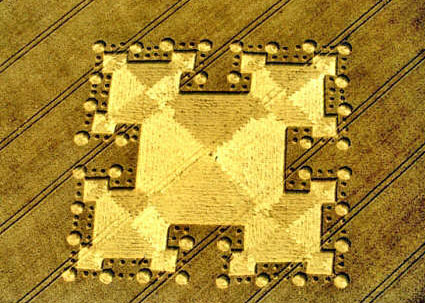
Figure 8 – English crop formation at West Kennett, August 4, 1999, showing
“fractal” octahedron pattern
On 3/3/3, Dr. David Whitehouse published an article on
BBC News Online that
appears to confirm this “fractal” concept of the universe. The article
discusses Dr. Max Tegmark’s work with the Wilkinson
Microwave Anisotropy Probe, or MAP, which was launched in 2001. This probe is designed to measure
slight temperature changes in the Cosmic Microwave Background (CMB)
radiation in the universe, which is considered the “echo of the Big Bang,”
the original leftover radiation from when the universe was first formed.
Following is an excerpt from the article itself.
Dr. Tegmark and colleagues present the
CMB as a sphere: “The entire
observable Universe is inside this sphere, with us at the centre of it.” In
so doing, the team find something unexpected and so far unexplained in the
symmetry of the CMB. In producing [the “best image yet” of the CMB,]
Dr. Tegmark removed all sources of contaminating foreground radiation, leaving
only the cosmic background itself…
The expected variations in the CMB’s intensity turned out to be so hard to
detect that it was only in 1992 that they were first seen… And he added: “We
found something very bizarre; there is some extra, so far unexplained
structure in the CMB… We had expected that the microwave background would be
truly isotropic, with no preferred direction in space but that may not be
the case.”
Looking at the symmetry of the CMB – measures technically called its
octopole and quadrupole components – the researchers uncovered a curious
pattern. They had expected to see no pattern at all but what they saw was
anything but random.
“The octopole and quadropole
components are arranged in a straight line
across the sky, along a kind of cosmic equator. That’s weird… We don’t think
this is due to foreground contamination,” Dr. Tegmark said. “It could be
telling us something about the shape of space on the largest scales. We did
not expect this and cannot yet explain it.”
It may mean that the
CMB is clumpier in some directions than others. Some
theories of the structure of the Universe predict this but observational
evidence to support it would be a major discovery. (Whitehouse, 2003)
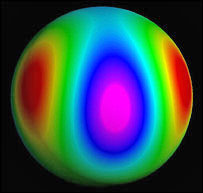
Figure 9 – The octopolar / quadropolar structure of the CMB in the universe.
SUMMARY AND CONCLUSIONS
Here are six key points not clearly articulated in the excerpt above:
1. An “octopolar” formation on the surface of a sphere gives you all the
coordinates to play “connect-the-dots” and draw an octahedron inside.
2. This discovery confirms Battaner et al.’s suggestion that the
octahedron
structure of superclusters would continue, like a fractal, to the entire
Universe.
3. The Sun’s magnetic field is also a combination of
quadropolar and
octopolar formations. This shows a fractal / holographic connection between
the Sun and the Universe – the same basic structure on different levels of
size.
4. Cutting-edge Japanese, Russian and French research into “Microcluster
Physics” has demonstrated that atoms naturally tend to group together into
Platonic Solid crystalline structures such as the octahedron. In forming
these clusters, they lose any differentiating individuality and all their
electron clouds flow through a common nucleus in the center. This completely
defeats the particle model of the atom. (Section 3.4, The Divine Cosmos)
5. The M=2 and L=2 electron clouds, a basic “orbital” structure within most
atoms, also perfectly map out the coordinates of an octahedron.
(Figure 2.2,
The Divine Cosmos)
6. Ray Tomes’ research shows that all the different levels of size we are
discussing are precisely interrelated by the harmonic expansion factor of
34560. (Section 7.8, The Divine Cosmos)
The evidence that we have presented in this article suggests the structure
of the universe is precisely determined by vibration, at all levels of size.
If the frequency of vibration increases, then the geometry itself becomes
more complex. If the geometry of the atoms and molecules of so-called
“physical” matter changes, then what happens to the matter? We must go leaps
and bounds beyond the limits of conventional scientific thinking to even
imagine the possibilities, but it appears the man Jesus came here to show us
what we would all be capable of doing in the future: “As I do these things,
so shall ye do them, and greater things, for I go unto my Father.” (Holy
Bible, John 14:12.) The idea of our world being a “Matrix based on rules”
where “some of those rules, such as gravity, can be broken” might not be so
farfetched after all.
Free your mind.
There is no spoon.
APPENDIX 1:
To his credit, Dr. Nicolai Levashov was the first to include Battaner et
al’s discovery and its spiritual implications for a “fractal” universe in a
limited edition for-profit manuscript released some time in the mid to late
1990s. Apparently, the document is quite expensive and only a very small
number of copies have circulated, primarily in the Bay Area of California.
We thank Mark Comings, a featured guest speaker at our Time of Global Shift
seminar in Huntsville, Alabama last November, for bringing this to our
attention.
Before the conversation with Comings, we did inadvertently locate the data
about the “matrix” structure of superclusters twice in our Internet research
and actually publish the results in Divine Cosmos, where it was referred to
as a “3D chessboard” with no mention of the octahedron. We first found it in
S.N. Kimball’s Symmetric Theory, and we located additional data about it
while poring through the immense Physics News online archives. You can read
what we wrote about it in
Chapter 7, Section 7 of Divine Cosmos
How did we miss the importance of the geometry? Had we seen a picture of the
structure itself, or heard that it had anything directly to do with the
Platonic Solids, it never would have happened. Our mistake was a classic
one, in that we chose to blindly agree with S.N. Kimball’s assertions that
the presumed “chessboard” structure did not actually exist, but was only a
subset of something larger – namely, a Super-Galaxy formation composed of
all the superclusters in the Universe. There simply is not enough time to
explore every single lead from every single data point that we have included
in all three books, but thankfully the “Internet peer review” process has
been quite beneficial due to the visibility of our website.
As you can read in the
above section of Divine Cosmos, the long-range
structure of the “chessboard” has only been measured by taking a very narrow
slice of data, similar to analyzing one line scratched from the center hole
of a vinyl LP to its far edge. Kimball believes that the Piscis / Cetus
region in Figure 6 is showing us a narrow slice of one arm in a giant
Super-Galaxy. Indeed, there is a slight curvature to this cluster, and Battaner et al. state in their papers that this “gravitational distortion”
is simply caused by the larger size of the cluster.
The bottom line is that the “chessboard” structure of superclusters is
easily visible for extremely long distances in the hard data, but despite
S.N. Kimball’s enthusiastic speculations, we do not actually see the arms of
a super-sized spiral galaxy. Furthermore, the matrix of octahedrons is at
least three octahedrons tall, further complicating the idea that any of the
edges of these octahedrons could connect together to be part of a galactic
spiral. We do know, however, that all of the superclusters in the Universe
are in a flat “pancake” (lenticular) structure, similar to the shape of a
galaxy. As the data in
Chapter 7 of Divine Cosmos shows, there is a
definite, obvious “fractal” connection between the structure of the Universe
and that of all other size levels.
The structure of the Universe appears to be a far more ornate, perfect and
precise geometric version of what exists potentially in a galaxy, thus
making its structure more akin to what we believe is found at the very
tiniest level in the quantum realm. This can be seen in Figure 7 of this
article, as rendered in a “crop circle” formation.
By the fractal principle we should also see at least the beginning stages of
similar geometric arrangements between the arms of our own
Galaxy. Indeed,
Dr. Paul LaViolette has discovered curious geometric alignments between
pulsars in our galaxy, and this could be a partial satisfaction of our
theory. We will have researched this data in more detail for the final
version of Divine Cosmos when it becomes available, hopefully by August.
REFERENCES:
-
Battaner, E. The fractal octahedron network of the large scale structure.
Astronomy and Astrophysics, Vol. 334 No. 3, p. 770-771. URL:
http://link.springer.de/link/service/journals/ 00230/tocs/t8334003.htm
-
Caltech University. Large scale structure and magnetic fields. URL:
http://nedwww.ipac.caltech.edu/level5/ March01/Battaner/node48.html
-
Hoagland, Richard. The Monuments of Mars. North Atlantic Press, 1990. URL:
http://www.enterprisemission.com
-
Whitehouse, David. Map Reveals Strange Cosmos. BBC News Online, Monday, 3
March 2003, 13:23 GMT. URL:
http://news.bbc.co.uk/2/hi/science/nature/2814947.stm
-
Wilcock, David. Convergence, Vol. I, II and
III.
-
Wolff, Milo. Exploring the Physics of the Unknown Universe. Technotran
Press, Manhattan Beach, CA, 1990. ISBN 0-9627787-0-2. URL:
http://members.tripod.com/mwolff

|








